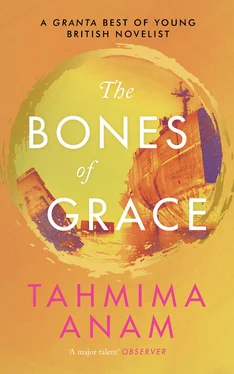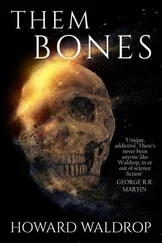It starts to rain, hard like someone’s hurling it out of the sky. Finally the rage devils into my body and I lift up my head and drive it into her stomach. I’m pounding madam’s stomach with my fists, thinking about Megna and Pahari and Shathi and my father who made me dig out the latrine, and my poor little seedling who was in this hellhole all the time, just past my fingertips, until madam slumps against the wall and through the blood bubble at her lip, she says, ‘Go to the beach called “Prosperity”. There’s a kid that hangs around, a boy. Your daughter’s with him.’
VII My Girl Falls from the Sky
Dulal and me run all the way back down the road and the rain feels like fire on my back and my scars are beating with my blood. Dulal slows down, his hands on his knees, but I say, ‘Come on, we have to find that kid.’ I’m not letting myself think about anything except finding him. We go all the way up and down, asking which yard is called ‘Prosperity’ and we’re wetter than dogs by the time we come upon a group of men standing around in the dark and the rain. ‘What’s going on?’ Dulal asks.
‘Do you know what they’re doing, these richies?’ someone’s saying. ‘They’re sending an air-conditioned truck to pick up a piece of furniture. Yep, ship there, there’s a big, black chair, bigger than any chair you ever saw. Owner’s selling it to some rich American, won’t even let the thing come out into the air, wants to take it to Dhaka like a bride, wrapped up and protected from the hot. Can you believe it? A chair’s got a better life than us.’
‘We don’t want trouble, we’re just looking for a kid,’ Dulal says.
‘Someone’s going to die getting the chair out.’
We always die, I think. That’s why we’re here. Even when we live, we die.
Dulal gives up. ‘Let’s get out of here.’
‘We have to find him,’ I say. ‘He’s got to be here.’ I don’t give a fuck about this chair or whatever asshole is taking it to America. ‘A kid,’ I say to everyone I see. ‘I’m looking for a kid who hangs around here.’ No one’s listening. I raise my voice. ‘Ask Selim,’ someone says, ‘he’s in charge.’ He points to the front of the crowd. Dulal and me follow the men down the beach till they turn into an alley.
We walk a few shanties down and go into a long room. Inside, there’s a mess of arms and legs. Everyone got something broken. They show me their stumps and their scars. They have arsenic and all kinds of shit in their veins and all over their skin. So this is how it’s going to be. Even Shathi wouldn’t have me this way, not even she, the saint who forgives everything. You couldn’t love a man broken like that.
Selim’s a big guy with long arms and a chest full of meat. He’s saying they’re going to march onto the ship with the chair and bring the whole thing down. In the morning, holding the chair high above their heads, they’re going to walk all the way from the beach to the town. There’s a foreign girl who’s going to put the whole thing on TV. I keep shouting for the kid. ‘He has my girl,’ I say to everyone. They look at me like I’m bringing all the crazy into the room. I try to push my way to Selim, and when I find him he looks me up and down and says, ‘There’s a boy here, it might be him. Come to the beach with us.’
Soon we’re making our way to the beach, holding kerosene lamps, torches, whatever will get us through the dark. It’s raining so hard everything’s blurry and we can’t see more than a few feet in front of us. The shipyard gates are locked but all we have to do is get out onto the water and cross over. ‘Which one is it?’ ‘The pretty one,’ Selim says, ‘all white like it’s dressed up for a party.’ Selim carries one of the broken men on his back like it’s nothing. We wade through the water, across the end of a tanker, past a pair of propellers on their last cutting, and finally we see it, a pretty little cruise ship half broken.
‘What do we do now,’ we ask Selim. ‘Where’s the kid?’ I say. ‘Hey,’ he shouts, ‘where’s that kid?’ No one’s seen him. We wait for the chair to come out. ‘See — there’s the men, they built a ramp halfway up the ship because the chair’s so heavy.’ We stand around and wait for something to happen. The rain lets up for a few minutes, then hardens and throws bullets of water onto our heads. Soon the sky starts to turn yellow and it’s about to be morning, and just as the light is making its way onto our little piece of the beach, we see something coming out of the ship. ‘It’s here,’ Selim yells. ‘The chair is coming!’
A crate’s loaded onto the ramp. Six men are holding on and one of them’s shouting. Now that it’s light I start making my way to the front to see if I can find the kid. Instead I see a woman. She’s got hair plastered to her back and she’s shouting to the chair guys. ‘Hai, Allah,’ we say. Our stomachs are in our mouths watching this crate like a boulder rolling down the ramp. It’s going fast now, faster than it should, and we’re watching as it speeds up, running away from the men, and then, like a bar of soap, it slides off the ramp, and we’re all running back until we hear a crash, something so loud and crazy we scream back at it like it’s going to eat us alive.
We circle around and I see pieces of the black chair scattered like giant grains of sesame. I see a woman, hair plastered across her face, a trickle of blood coming out of her head, and there’s a boy pinned under the crate, and then another kid, head shaved clean, and that’s when I start to cry, ‘My girl, my girl, my girl,’ because even without the curl of her hair, I know she’s mine, that face, that blessed face I thought I’d never see again.
You see now why I had to tell you, Elijah — or rather, why he had to tell you? I wasn’t the only one in Chittagong in search of a self. I wasn’t the only one who felt like the loneliest person in the world. The whole time I was there, as I made friends with Mo and got to know the workers on the beach and fell in love with you, he was right beside me, carrying around my secret like a talisman dangling from his neck.
It’s time to turn now to the matter of us, to your days on the beach, that perfect bubble of bliss I couldn’t help but shatter.
Did you know, Elijah, that I was named after the Abbasid princess Zubaidah bint Ja’far, who inspired The Thousand and One Nights ? My mother, who everyone calls Maya but whose formal name is actually Sheherezade Haque, was herself named after the narrator of that great epic, the Persian queen Sheherezade, a name given to her by her father, Iqbal Haque, who died of a heart attack when my mother was only six. Zubaidah bint Ja’far herself was not called Zubaidah at birth, but Sukhainah. And my name at birth — well, I will never know that, will I? There was some debate as to whether I should, like my mother and most of the people we knew, have a nickname as well as a formal name. The privilege of choosing the name was given to my dadu, my paternal grandmother. She chose the name Putul, which means ‘doll’, and would not be persuaded to change her mind, even after my mother protested that no daughter of hers could possibly answer to the name Doll.
In an effort to remove the name from its meaning, my parents shortened it further, and Putul became Putlie, Pootsie, Poo, Potla, Potlu, and Potato, until finally only one stuck: Poots. Poots was the girl I was back home, when it was just my parents and me. Poots was what my dadu and my nanu and the servants called me. When my friends came over I went to great lengths to make sure no one would call out to me from the kitchen or accidentally let slip that I had the most embarrassing nickname in the world. In high school I put a ban on Poots, the sobriquet by then completely revolting to me, and my parents obeyed, settling on the diminutive of my formal name, Zee, which is also what Rashid and all my school friends and even some of the people I knew in college and graduate school called me.
Читать дальше












